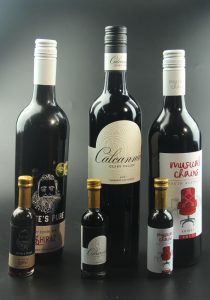Striking a balance between an online and a physical presence in China is becoming crucial to the success of a platform that provides miniature samples of Australian wine to drive direct to consumer sales.

Adelaide-based startup Trust in Taste launched its online channel in partnership with five South Australian wineries through Chinese social media platform WeChat about 12 months ago.
The business has grown to partner with 25 brands across 10 wineries and is now using a membership model and conducting physical tastings in China to create familiarity with the novel concept.
The unique point of difference with Trust in Taste centres around its technology that allows wine to be transferred from regular 750ml bottles into the small 60ml tasting samples without affecting wine quality.
The initial business model invited Chinese wine drinkers to sign up for an in-home tasting where three Trust in Taste wines in 60ml bottles are delivered for a cellar door style tasting. When scanned, the QR code on each miniature bottle takes the taster to the Trust in Taste WeChat store where more information on the wine is provided, including a video with the winemaker.
Trust in Taste co-founder Peter Evans said the membership aspect had been introduced to try to improve the conversion rate to full bottle sales.
He said the company was also fundraising at the moment to help bring more wineries on board.
“We have about 3000 members now,” he said.
“Membership will get them a pack of three samples and they then retain the membership benefits, which are discounts in store and invites to tasting events and for three, six or 12 months depending on the level of membership.”

Focusing on the fast-growing coastal city of Qingdao in eastern China, Trust in Taste has also started to run physical tastings to increase familiarity with the concept and sign up new members.
“We’ve learnt that just being online isn’t going to do it for us,” Evans said.
“We need to do O2O – offline to online – and that’s physically meeting people and then getting them to buy online.
“Currently we’re hosting wine tastings and we’re doing pop up tastings in shopping centres and in the lobby of office blocks at lunchtime and then we can collect their details and work from there.”
Trust in Taste has an office in Qingdao, which has a population of 5.5 million.
“We’re in a testing phase with the tastings and if we can make it work in these smaller cities then we can roll it out in other parts of China,” Evans said.
“We began that in October and now we’re in December and we’re looking to ramp up towards Chinese New Year celebrations, which begin at the end of January.
“We know we have a unique offering and we’ve got liquid on lips so it’s now about working out how to get the conversion metrics right and expanding it across other cities.”
Trust in Taste is also working with colleges that run wine appreciation courses for enthusiasts to provide samples and give them the chance to try Australian wines they otherwise wouldn’t be able to access.
“There’s a real excitement about the product, they love the way it looks so when we do the tastings we do it with the small bottles and also the large bottles so we can show that both taste the same,” Evans said.
“It’s definitely a point of difference and an innovation but in the end, we’re a direct to consumer wine company and we want to sell full bottles of Australian wine to consumers in China and we really want to open up the market for second and third tier Australian producers.”
“The Chinese wine market is incredibly fragmented and our key market is 55 per cent female, professional and all of these will have one or two people in their wider circle of friends who can sell them wine.
“We are endeavouring to be their trusted friend who consistently has good value, unique Australian wine.”
Australian wine exports to China in the year to June 30 reached a record $1.2 billion.
South Australia is consistently responsible for about 50 per cent of Australia’s annual production and 80 per cent of its premium wine.
There are more than 200 cellar doors within an hour’s drive of the city centre of Adelaide in regions including Barossa Valley, McLaren Vale and Adelaide Hills.
















